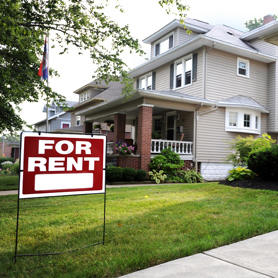
- Rental Home Insurance
- Overview
- FAQs
- Eligibility
- Highlights
- Availability
- Resources
Overview
For many business investors, landlords and other owners of residential property, rental income is critical to the success of their investment. Because property is tenant occupied, residential owners or landlords need more than standard homeowners insurance to ensure adequate protection for their property. Rental home insurance, also known as landlord insurance, is essential to protecting their asset.
Our rental dwelling insurance policy offers coverage for owners and investors against direct physical loss or damage to their residential rental property or personal property left onsite, as well as liability should someone become injured on the property. Should the occupancy of the property change during the policy term, property coverage can easily be converted to an unoccupied property insurance policy.
FAQs
Many owners and landlords are surprised to learn that their homeowners’ policies typically do not cover homes that are rented out to tenants. Rental home insurance provides crucial coverage to protect their investment against a variety of exposures. These include fire and smoke caused by tenants or their guests, weather events like lightning, wind and hail storms, water damage, sewer or drain backups, and vandalism, among others. A rental home policy may also include liability protection to cover legal, medical and settlement expenses in the event a tenant or guest becomes injured while on the premises.
Some of the most common scenarios for purchasing rental home insurance include property owners who have moved out and are now renting the building; property investors / owners who regularly lease homes to tenants; and apartment / condominium owners who own and rent out properties with one-to-four units per location.
Rental home insurance coverage is available through US Assure for residential, tenant-occupied structures with a minimum 12-month lease agreement. We do not cover seasonal rentals or any type of vacation rentals.
The cost of rental home coverage will depend on the age and location of the property, the size of the property, the number of units in the building, whether the structure is locked and secure, and other factors.
Coverage for personal property may be available if the owner / landlord has personal property stored on the premises in a separate garage, shed or other structure that is physically separate from the main structure. However, that structure must have an active fire and burglar alarm.
Coverage for personal property does not extend to tenants. Landlords should always encourage or require their tenants to secure renter’s insurance policy / policies to protect their own personal property and cover potential liability exposure.
Eligibility
- Well-maintained one-to-four family unit dwellings (including their detached structures) that are occupied by tenants only
- Property owner must demonstrate continuous insurance coverage for the past three years
- Row homes
- Condominium or co-op units
- Manufactured / mobile homes — provided they are fixed to permanent foundations, skirted and are not movable
- Detached structures, such as garages and larger storage sheds, which can be rented to tenants provided they are not used for any commercial purposes (a separate limit is required for these structures)
- All protection classes when a fire station is located within six miles
Highlights
- Streamlined underwriting and online application process
- Standard 12-month policy term, with short-term policies available in many states
- Optional coverage includes loss of rents, back-up of sewer and drains, and theft
- Insured by a respected “A” rated carrier and serviced by our team of experts
- Property coverage up to $5M; premises liability up to $1 million each occurrence / $2M aggregate
- Minimum property value is $20,000 for condominiums and $50,000 for all other residential dwellings
- Rental dwelling policy can easily be converted to a vacant structure policy
- Offered on an admitted basis in most states
- Direct bill with premium payment installment options and a credit card payment method
- Available with no premium commitment
Availability
Admitted: AL, AR, AZ, CO, CT, GA, IA, IL, IN, KS, KY, LA, MA, MI, MN, MO, MS, NC, NE, NJ, NM, NV, NY, OH, PA, SC, SD, TN, TX, VA and WI
Non-admitted: CA










